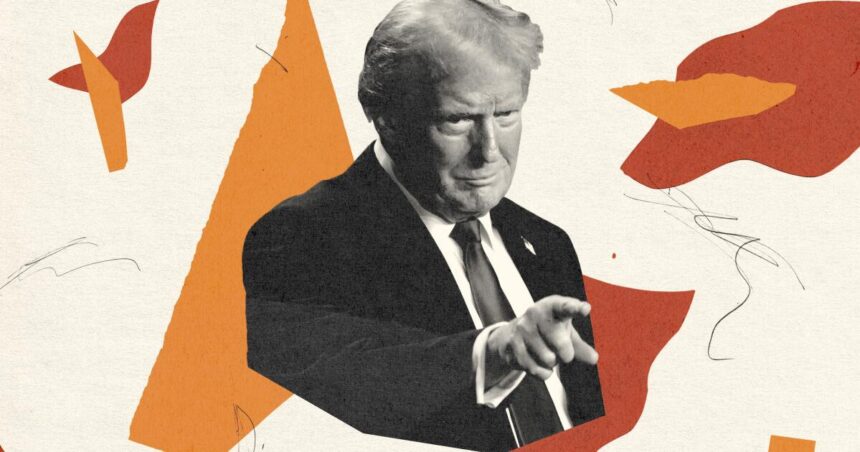To much of Hollywood’s decidedly liberal base, Donald Trump is truly the enemy from within, a former reality show host who used the power of television to launch himself to the highest stage of world politics.
As they did in 2016 and 2020, celebs from across the film, TV and music industry mobilized against his run for the presidency. There were Kamala Harris rallies. All for naught.
But at the corporate level of the media and entertainment industry, it’s not exactly the resurgence of the anti-Trump resistance.
Much of the reaction among show business and technology chief executives has been either explicitly supportive or generally hopeful that the new Republican administration will be more business-friendly, particularly when it comes to taxes, regulation, artificial intelligence and M&A (mergers and acquisitions).
Stocks surged in the days after the election. Bitcoin hit Monday on the belief that Trump will be less hostile to cryptocurrency.
Apple CEO and Amazon Executive Chairman tweeted their congratulations to the president-elect. Elon Musk, whose social media platform X remains highly influential, directly backed Trump’s return to the White House.
David Zaslav, the head of Warner Bros. Discovery, last week said he’s optimistic about what the new administration will mean for dealmaking, in contrast to the more restrictive regulatory environment under President Biden.
“It’s too early to tell, but it may offer a pace of change and an opportunity for consolidation that may be quite different, that would provide a real positive and accelerated impact on this industry that’s needed,” Zaslav on a conference call to discuss earnings.
Perry Sook, CEO of local TV station owner Nexstar Media Group, deregulation in broadcasting, taking aim at “antiquated ownership caps.”
In other words, get ready for more consolidation. On the one hand, legacy media is a business and is therefore primed for reorganization. Pay-TV bundles are going away. The box office has lost about a quarter of its pre-pandemic annual domestic revenue. Streaming is reaching profitability for many companies, but it has taken much disruption and billions of dollars in losses to get there.
On the other hand, many media mergers don’t work out well, particularly for employees. Look at AT&T’s troubled and short-lived stewardship of WarnerMedia.
“If I were wealthy today, I would not be buying stock in the entertainment world,” Stephen Galloway, dean of Chapman University’s Dodge College of Film and Media Arts, . “There’s going to be a lot of turbulence.”
How pro-M&A will Trump 2.0 be? It’s reasonable to look to the first Trump administration’s behavior for clues, though there are limits to that technique because of the man’s mercurial nature.
The AT&T-Time Warner approval process dragged on for years. That disastrous marriage resulted from a merger that, funnily enough, the first Trump administration Many believed Trump’s hatred of CNN was a factor.
Meanwhile, Walt Disney Co.’s purchase of 21st Century Fox entertainment assets sailed through (Rupert Murdoch’s cable news network, which wasn’t part of the deal, is heavily pro-Trump). Trump’s first administration lifted key regulations, including the , which broke up the old Hollywood monopolies in the 1940s.
Trump is widely expected to replace Lina Khan as head of the Federal Trade Commission, which has been a thorn in the side of Big Tech during the Biden-Harris years. However, if you just look at the technology giants (many of which own media and entertainment platforms), it’s clear that Trump isn’t against taking swipes at large and powerful companies.
Mere weeks before election day in 2020, his Justice Department sued Google on antitrust grounds over the firm’s dominance of the internet search market. As my colleagues Queenie Wong and Wendy Lee , Trump has been critical of Facebook parent Meta Platforms and Google for alleged censorship. And let’s not forget that Trump also led the charge to ban TikTok because of its ties with China, a position he seems to have on.
Which offers another clue about why tech barons and media titans are voicing support for the incoming administration. Flattering Trump — or at least not openly insulting him — might be a cost of doing business if your company will have to deal with the federal government at some point.
Corporate media had already shown signs of backing away from overt political activism, even prior to the election.
Disney CEO Bob Iger, who has previously spoken out against conservative policies on abortion and gay rights, has lately moved the company away from in its content, stating that the goal must be to prioritize entertainment.
The company was by its battle with Florida Gov. Ron DeSantis over the state’s public education law (decried by critics as “Don’t Say Gay” legislation) that cracked down on instruction about sexual orientation and gender identity. That controversy erupted when liberal Disney employees pressured then-CEO Bob Chapek to speak out.
Another issue that businesses, including Hollywood, will closely watch is tariffs.
One of Trump’s favorite policy proposals is to enact steep tariffs on goods from overseas, which could spark trade wars. However, we’ve seen that Apple, for example, which relies heavily on China to manufacture its devices, managed to get itself exempted from tariffs. China has historically been an important box office market for Hollywood blockbusters, though that has in recent years.
As Stratechery founder Ben Thompson noted on a recent , many of Trump’s outlandish statements make more sense if you think of them in terms of dealmaking. “With Trump, you have to assume that everything is a negotiation,” Thompson said.
So we’ll see how serious any of this becomes.
The other big question is what kinds of deals make sense for the entertainment industry in the next four years, assuming the regulatory bumpers are removed.
Could Tim Cook finally go into full tycoon mode and have Apple buy Disney or another major content company? That’s theoretically more plausible now than it would have been under a Harris administration. But Apple’s entertainment business ambitions have been limited so far, with Apple TV+ positioning itself as a more boutique streaming offering focused on quality.
NBCUniversal parent Comcast Corp. recently said it was exploring the possibility of its cable networks such as Bravo, CNBC and MSNBC into a separate company, in yet another sign of the waning power of linear channels. Analysts have floated the argument that deal-hungry legacy media organizations should cleave off their declining cable networks and forge ahead as leaner studio and streaming operations.
Maybe the spun-off groups of linear networks will end up combining with one another, using their combined leverage to maintain the fees they get from the cable and satellite operators. How such an operation would fare is uncertain, though it would most likely be under private equity ownership, which would value the cash flow.
None of this should sound like good news for employment, which is already under serious pressure as media conglomerates reckon with changes in the industry. But to put it as the incoming commander in chief might, there will be consolidation, whether people like it or not.
Stuff we wrote
Mattel apologizes and pulls its line of “Wicked”-themed dolls from stores after misprinting its website link, sending consumers to an adult film site.
News consumers are slipping away from TV networks and newspapers. Trump’s victory showed how legacy media is losing relevance to personality-driven programming, including podcasts.
Ratings for TV election coverage dropped a stunning 25% from 2020’s presidential campaign cycle, drawing 42.3 million TV viewers.
ICYMI:
Number of the week
The Los Angeles region broke a record in the third quarter, capturing $1.8 billion in venture capital investment for artificial intelligence startups with a total of 31 deals, according to a report by CB Insights. L.A. ranked as the second-biggest market for AI investments, up from the previous quarter, in which it ranked behind Silicon Valley, New York and Boston.
Is Southern California becoming a major hub for AI investment and innovation? Many in the local tech industry are certainly hoping that new artificial intelligence tools can help boost the region’s status, especially with applications in areas such as manufacturing, entertainment and healthcare, my colleague Wendy Lee wrote in on the report.
Notably, the bulk of the capital came from a single deal: a $1.5-billion funding round for Palmer Luckey’s Costa Mesa-based defense technology firm Anduril Industries, which valued the seven-year-old business at $14 billion. The deal, which was announced in August, was led by Founders Fund and Sands Capital.
Film shoots
What a difference an actors’ strike makes. Here’s FilmLA’s latest production data, with year-over-year comparisons.
Finally …
The are always a fun way to catch up on terrific, eclectic music that I overlooked in the past year or so. My pick for this week, nominated for alternative jazz album, is Arooj Aftab’s “.” Here’s a .










